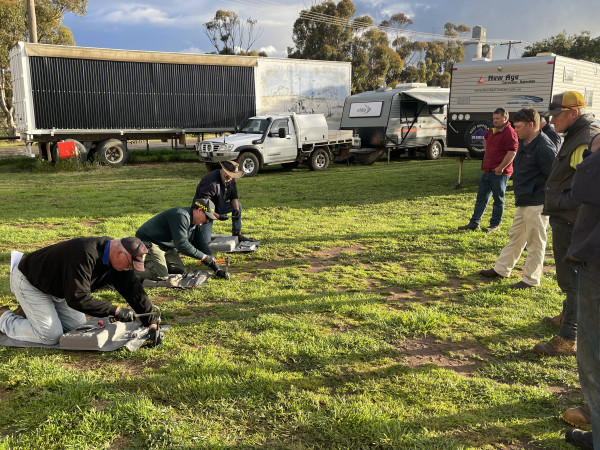MALLEE Landcare Group are working collaboratively with government agencies on the region’s first wild dog baiting program for both private and public land.
Farmers from Patchewollock and Underbool attended a planning meeting to kickstart the program, working with the Department of Environment, Land, Water and Planning (DELWP).
Together they were laying baits and using bait stations in strategic locations, where wild dogs were known to be preying on livestock.
DELWP senior wild dog control officer Mark Scott conducted a training day in September with Patchewollock landholders on strategies and techniques.
Mr Scott has two separate bait runs along the Wyperfeld National Park and Patchewollock State Forest boundary, each running for six weeks during September to December.
Mallee Landcare Group vice-president Alex Hulland said wild dog attacks in the region were mostly rare for the past 20 years, until recent times when the feral pests had begun migrating from the Big Desert Wilderness Park and Wyperfeld National Park into the Patchewollock area, up to 100km along the park boundary.
Mr Hulland said ewes and lambs had been lost to wild dogs on seven local farms over the past year.
He said Mallee Landcare Group had provided subsidised manufactured baits as an incentive to landholders to bait in conjunction with the DELWP program.
“In the past we have been reactive to the wild dog attacks, but this is the first real proactive control program along a 100km stretch of the affected farms,” he said.
“Some farmers are 100 per cent cropping with no stock at all and these wild dogs would be passing through their properties without them knowing.
“We are encouraging them to bait in strategic locations where wild dogs are known to travel through, where there are tracks and scats and areas where livestock have been attacked in the past.”
Mr Scott is the first permanent full-time DELWP wild dog controller to be stationed in the Mallee, covering the 744,851 hectare Big Desert and Wyperfeld National Park, and is actively encouraging co-ordinated nil-tenure baiting programs.
Mr Scott is using data captured by remote sensing cameras to educate landholders to not just bait along boundary fences, but also strategically place them around watering points, along tree lines and further inside paddocks.
















